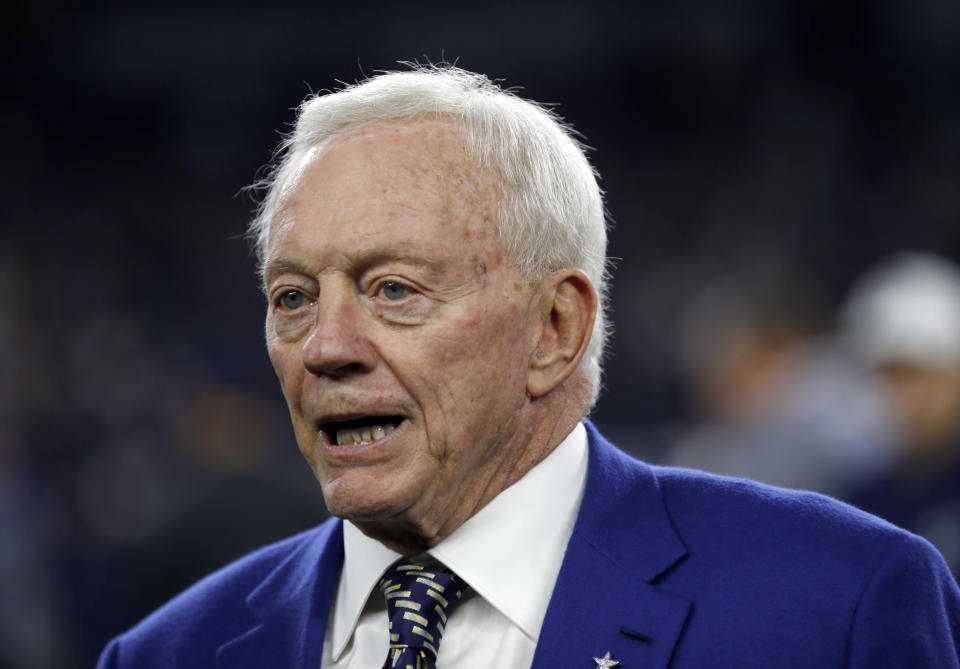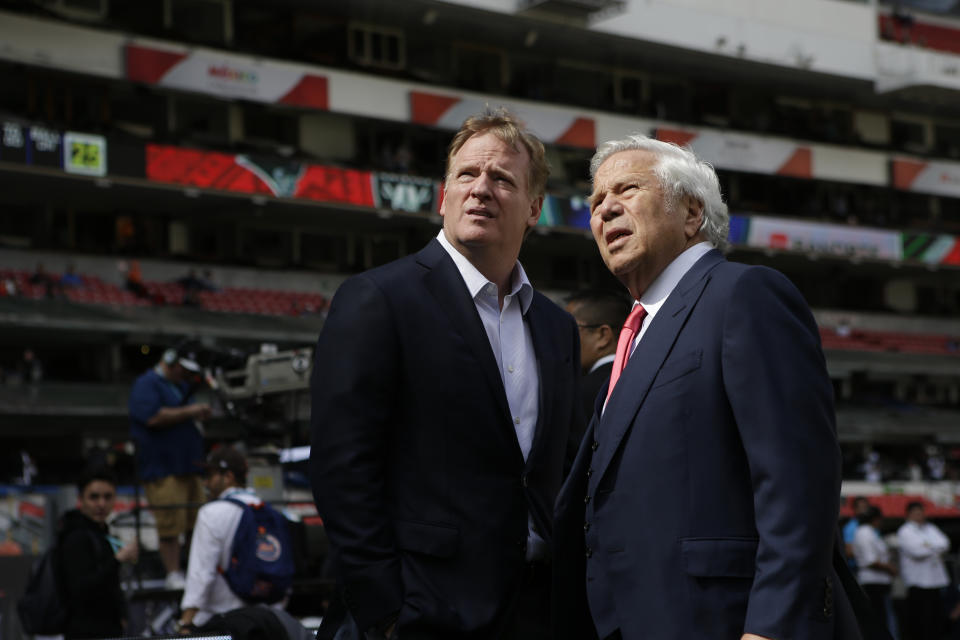Patriots jab at Jerry Jones, but Roger Goodell's bad medicine is root of billionaires' angst
The Jerry Jones question was coming on Sunday, and New England Patriots president Jonathan Kraft had to have known it. His needle was too perfectly placed in the ribs of the Dallas Cowboys owner to not have been rehearsed in advance.
“Take your medicine.”
That’s the advice Kraft had for Jones on Sunday, when asked about the Cowboys owner lashing out against commissioner Roger Goodell over the discipline of running back Ezekiel Elliott. Kraft wasn’t bombastic about it. He wasn’t even celebratory. But he was definitely clear: Jerry Jones had once instructed the Patriots to take their medicine when quarterback Tom Brady was getting shafted by the disciplinary process. Now it was time for Jones to do the same.
Jones “said basically, ‘I think y’all should take your medicine and just focus on winning football games,’” Kraft told the Patriots Radio Network on Sunday. “… And when you’re upset and you’re angry, it’s not what you want to hear – because I don’t think Tom [Brady] was treated fairly. I don’t think any of our fans feel Tom was treated fairly, but we ended up taking [Jerry’s] advice and we ended up winning the Super Bowl. I think it was good advice.”

As sneering goes, this qualifies as high-brow. The Patriots and Brady took the hit and Jerry sat back and sipped his tea. Now the Patriots have watched the league office turn on the Cowboys, so they’re giving it right back to Jerry. Something along the lines of:
Remember when we got hosed? Welcome to the club. Now shut up like we did.
You can hardly blame the Patriots or the Kraft family on this point. But there is something palpable being lost in all of this. Boiled down, the Cowboys and Patriots are on the same side of one root argument: Goodell overreached and used the disciplinary process to damage their franchises. Whether it was Brady in deflate-gate or Elliott’s “fundamental fairness” domestic violence quagmire, both franchises walked away with deep misgivings over the league’s ability to objectively handle investigations. Somehow, that has been overshadowed – that two of the league’s most powerful and valuable commodities felt wronged by Goodell.
The Kraft family took their medicine and still retain bitterness about it. Jones has refused to accept total defeat – to the point of a vengeance that threatens to tear at the fabric of the entire ownership community. That alone should raise questions about Goodell’s continued role in discipline.
Two in particular: How many other franchises will absorb the blunt end of the league’s disciplinary hammer before Goodell’s role is challenged by owners? And perhaps more important, is the current civil war in NFL ownership worth enduring to maintain Goodell as judge and jury?
Before answering, consider what Goodell’s throne in the disciplinary system has triggered.

His role in shaping and meting out discipline has drawn contempt from players, owners, fans and the NFL Players Association. His efforts have produced bad public relations, significant cost increases in the league’s executive ranks and spiraling legal bills. And now it has become the launching point for a rift among the NFL’s most powerful team owners.
For months, Jones has been attacking Goodell to the point of threatened litigation to hold up the commissioner’s contract extension. Inside of that effort, Jones is indirectly suggesting fractures within the ownership group. Then on Sunday, a ranking Kraft family executive took a subtle public jab at Jones, who is also one of the New England Patriots’ most important business partners. The previous Sunday? Jones and Atlanta Falcons owner Arthur Blank, one of the most important business partners in the league, stood on the same football field but went out of their ways to keep from speaking to each other. Meanwhile on the periphery, Washington Redskins owner Dan Snyder reportedly egged Jones on while New York Giants co-owner John Mara tried to balance close relationships with both the Cowboys owner and league commissioner.
No wonder the NBA’s Adam Silver reportedly shot down any chance of taking over the NFL’s executive throne. Who wants to deal with a 1 percenter dumpster fire that stretches from Beverly Hills to the Hamptons?
The league is in a situation where billionaires are taking shots at each other and maneuvering power plays that evoke memories of late Oakland Raiders owner Al Davis. And all of it is occurring while there is a litany of lingering public-relations issues that demand attention (pick one: concussions, ratings, Los Angeles, anthem protests, etc.).
Now, hovering above all of those pressing issues, is a battle between Jones and seemingly everybody. With the added uncertainty of where it will go, when it will end, or whether an adequate middle ground exists to make everyone happy. And perhaps worst of all, the knowledge that one key component that pushed the league into this – Goodell acting as the tip of the NFL’s disciplinary sword – appears unlikely to change.
That shouldn’t be forgotten in this. A large part of Jones’ current crusade is his insistence to not take his medicine in the Elliott case. To not trust Goodell because of how he handled this most recent case. And most of all, to not lay down like the Patriots, surrendering to a process that he now views as fundamentally flawed.
If not for the perceived flaws in the Elliott investigation, and Goodell’s fundamental role in sharpening the teeth in the discipline that followed, it’s worth questioning if the NFL would even be in this current predicament.
Yes, what is happening could simply be a case of Jones waiting to mount his coup against Goodell, seeking any tipping point for justification. But this entire fiasco could also be a derivative of Goodell’s placement at the top of the disciplinary hierarchy, which has pitted him against two of the league’s most powerful owners in back-to-back years.
Whether it’s the Patriots and Brady in 2016 or the Cowboys and Elliott in 2017, maybe it’s not the medicine that ails the NFL’s owners. Maybe it’s the guy they chose to deliver it.
And now they are left to wonder, is Roger Goodell’s role in discipline worth the problems it is creating for his bosses?
More NFL on Yahoo Sports

 Yahoo Sports
Yahoo Sports 